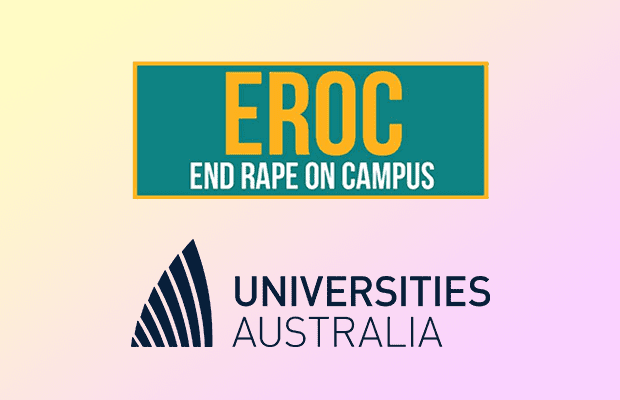Content warning: sexual assault
End Rape on Campus (EROC) Australia and the National Union of Students (NUS) Women’s Department have called upon Universities Australia, and Vice-Chancellors nation-wide, to commit to supporting a more ethical collection of data in the 2020 national survey into university sexual harassment and assault.
The University of Sydney (USyd), along with 38 other universities, have confirmed they will participate in a follow-up survey to the 2016 National Survey into University Sexual Assault and Harassment, as per the Report’s recommendation.
A USyd spokesperson confirmed to Honi that, “we are liaising with Universities Australia and at this stage intend to participate in the next round [of surveying].”
Although the first survey’s methodology was widely criticised for being unethical EROC has not yet had confirmation that the follow-up survey will use more ethical processes.
In 2017, the Australian Human Rights Council (AHRC) released Change The Course: National Report on Sexual Assault and Sexual Harassment at Australian Universities, based on data from a nation-wide survey of university students in 2016. EROC criticised the Report for not passing its submission questionnaire through ethics-approved, for its methodology making underreporting likely, all the while subjecting participants to poorly crafted questions that could have easily worsened personal trauma.
Moreover, according to a joint statement released by EROC and the NUS, there is currently a private tendering process to determine who will carry the survey out, meaning students are not being consulted about how the survey could be best conducted.
EROC Director, Nina Funnell, emailed several Vice Chancellors in an email last week, including Michael Spence, saying that “it is important that the mistakes made in 2016 are not repeated in 2020 and that VCs do not again expose their own students to unethical or poorly designed research which has the potential to cause harm.”
What were the mistakes of the 2017 Change The Course Report?
EROC’s inaugural newsletter, Blaze, provides further detail about the errors to be avoided in a second survey and report.
The survey was designed in such a way that seemingly made under-reporting of sexual assaults or harassment more likely. Instead of following best practice and using behaviour-based questions, individuals were asked to label whether they had been assaulted, prompting many to downplay the true nature of their experiences. The questions were also only available in English and were not formed with cultural sensitivity in mind, making reporting all the more difficult for individuals without English as their first language.
Moreover, the survey only sought out certain kinds of data, once again undermining the finding’s accuracy. The survey only called for testimonies from between 2015-16, excluding any experiences of students before then. Testimonies were not taken for off-campus cases of assault or harassment, even if the perpetrator was a university-member. The final report omitted the testimonies of under 18 year-olds from its quantitative data, only including them in its qualitative section.
USyd Wom*n’s Collective co-convenor, Jazzlyn Breen, said that “mistakes such as not allowing those under 18 to be counted in the quantitative aspect of the survey show a clear lack of understanding of the issue at hand.”
“Considering it is well known that students at university are often under the age of 18 when they begin and that women between the ages of 15 and 19 are 7 times more likely to be the victim of sexual assault in comparison to the overall population, this clearly undermines the accuracy of the survey.”
EROC’s recommendations for the 2020 survey
Without the assurance that the 2020 survey will be carried out by an organisation that has “demonstrated expertise in conducting best-practice research on sexual assault and sexual harassment,” EROC has given Universities Australia four recommendations.
The research must be carried out by independent expertise — according to Blaze, a Freedom of Information Investigation found that a Vice-Chancellor (who was also the outgoing Chair of Universities Australia) had been permitted to work on 2017 Report.
The second report must be free from the methodological shortcomings of its predecessor. To aid improvements, EROC have called for a working group of interest groups, including their own representatives, NUS members, an international student advocate, and “individuals with expertise in disability, LGBTIQ issues, the impact of sexual violence on Aboriginal and Torres Strait Islander peoples, and other culturally and linguistically diverse groups.”
Finally, unlike the 2017 Report, which was published without an ‘impact plan’ — EROC recommends greater consideration for how the findings will possibly trigger survivors in the community, overload under-trained Wom*ns and Queer officers with fresh disclosures, and expose inadequacies in sexual assault reporting hotlines.
“At a minimum,” EROC demand that the second report be supported by, “free training for student representatives and staff in Responding with Compassion and Vicarious Trauma, and the resurrection of the 24/7 1800 sexual assault counseling Hotline, to be run by a trauma expert body (ideally Rape and Domestic Violence Services Australia).”
It remains to be seen whether EROC’s recommendations will be embraced.
EROC Australia’s inaugural newsletter, Blaze, can be found in part on the NUS Women’s Department Facebook page. You can obtain a free full copy of Blaze by contacting nina@endrapeoncampusau.org.
If you have experienced or are at risk of sexual assault, 1800 424 017 is the 24/7 telephone crisis counseling service from the NSW Rape Crisis Centre for anyone in NSW and their non-offending supporters.
This article was updated 26 June 2019 to better reflect the errors of the 2016 AHRC national survey.





